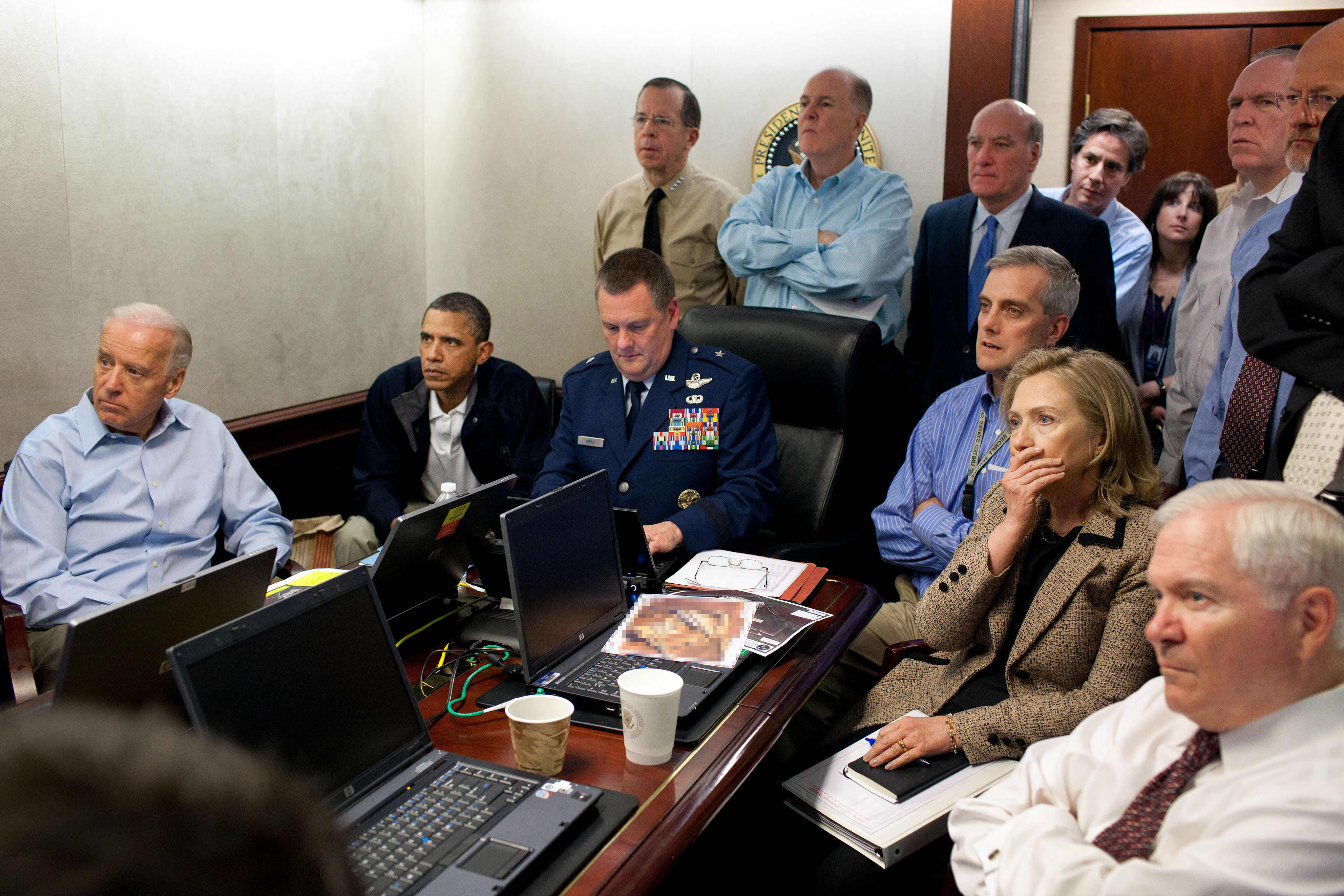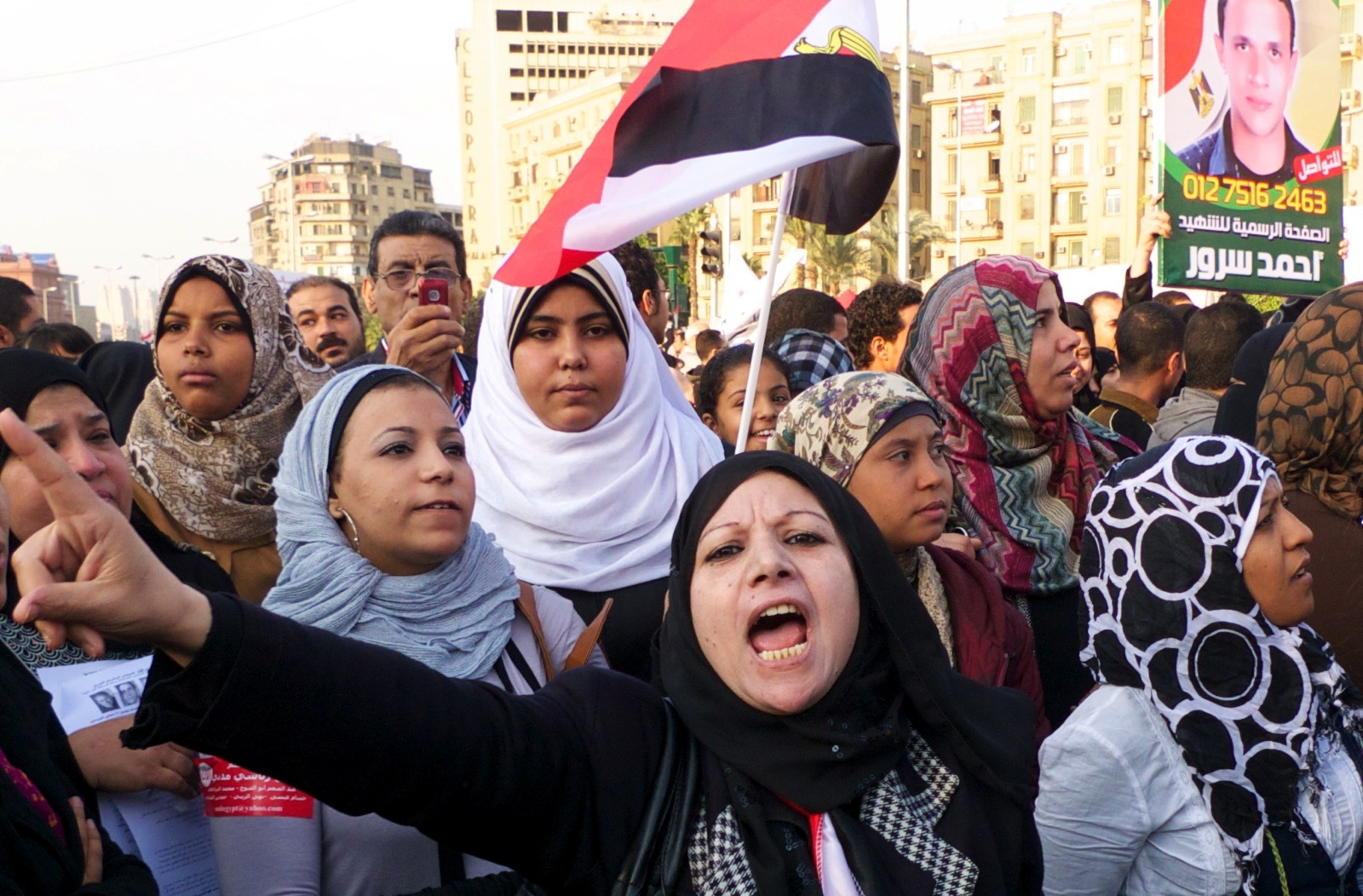Oriental studies
From Wikipedia, the free encyclopedia
(Redirected from Near Eastern Studies)

Ancient Assyrian
antiquities in the British Museum. In the 19th century the placing of
spectacular antiquities in the new museums brought unusual interest from
the general public to Oriental Studies.
Contents
History of Oriental studies
Pre-Islam
The Western world's original distinction between the "West" and the "East" was crystallised in the Greco-Persian Wars of the 5th century BC, when Athenian historians made a distinction between their "Athenian democracy" and that of the Persian monarchy. An institutional distinction between East and West did not exist as a defined polarity before the Oriens- and Occidens-divided administration of the Emperor Diocletian's Roman Empire at the end of the 3rd century AD, and the division of the Empire into Latin and Greek-speaking portions. The classical world had initimate knowledge of their Ancient Persian neighbours (and usually enemies), but very imprecise knowledge of most of the world further East, including the "Seres" (Chinese). However there was substantial direct Roman trade with India (unlike with China) in the Imperial period.Middle Ages
The rise of Islam and Muslim conquests in the 7th century established a sharp opposition, or even a sense of polarity, between medieval European Christendom and the medieval Islamic world (which stretched from the Middle East and Central Asia to North Africa and Andalusia). During the Middle Ages, Muslims and Jews were considered the "alien" enemies of Christendom. Popular medieval European knowledge of cultures farther to the East was poor, dependent on the wildly fictionalized travels of Sir John Mandeville and legends of Prester John, although the equally famous, and much longer, account by Marco Polo was a good deal more accurate.Scholarly work was initially very largely linguistic in nature, with primarily a religious focus on understanding both Biblical Hebrew and languages like Syriac with early Christian literature, but also from a wish to understand Arabic works on medicine, philosophy and science. This effort, also called the Studia Linguarum existed sporadically throughout the Middle Ages, and the "Renaissance of the 12th century" witnessed a particular growth in translations of Arabic texts into Latin, with figures like Constantine the African, who translated 37 books, mostly medical texts, from Arabic to Latin, and Herman of Carinthia, one of the translators of the Qur'an. The earliest translation of the Qur'an into Latin was completed in 1143, although little use was made of it until it was printed in 1543, after which it was translated into other European languages. Gerard of Cremona and others based themselves in Al-Andaluz to take advantage of the Arabic libraries and scholars there. Later, with the Christian Reconquista in full progress, such contacts became rarer in Spain. Chairs of Hebrew, Arabic and Aramaic were briefly established at Oxford, and four other universities following the Council of Vienne (1312)[1]
There was vague but increasing knowledge of the complex civilizations in China and India, from which luxury goods (notably cotton and silk textiles as well as ceramics) were imported. Although the Crusades produced relatively little in the way of scholarly interchange, the eruption of the Mongol Empire had strategic implications for both the Crusader kingdoms and Europe itself, and led to extended diplomatic contacts. From the Age of Exploration, European interest in mapping Asia, and especially the sea-routes, became intense, though mostly pursued outside the universities.
Renaissance to 1800
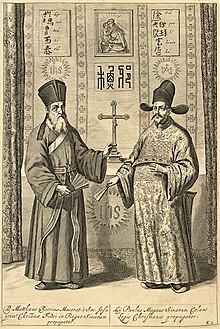
Matteo Ricci (left) and Xu Guangqi (徐光啟) (right) in the Chinese edition of Euclid's Elements (幾何原本) published in 1607.
During the 18th century Western scholars reached a reasonable basic level of understanding of the geography and most of the history of the region, though knowledge of the areas least accessible to Western travellers, like Japan and Tibet, and their languages, remained limited. Enlightenment thinkers characterized aspects of the pagan East as superior to the Christian West, in Montesquieu's Lettres Persanes or Voltaire's ironic promotion of Zoroastrianism; others, like Edward Gibbon, praised the relative religious tolerance of the Middle East as opposed to the intolerant Christian West, and many, including Diderot and Voltaire, the high social status of scholarship in Mandarin China.
The end of the century saw the beginnings in the great increase in study of the archaeology of the period, which was to be an ever-more important aspect of the field through the next century. Egyptology led the way, and as with many other ancient cultures, provided the linguists with new material for decipherment and study.
Nineteenth century
With a great increase in knowledge of Asia among Western specialists, increasing political and economic involvement in the region, and in particular the realization of the existence of close relations between Indian and European languages, by William Jones, there emerged more complex intellectual connections between the early history of Eastern and Western cultures. Some of these developments occurred in the context of Franco–British rivalry for control of India. Liberal economists, such as James Mill, denigrated Eastern civilizations as static and corrupt. Karl Marx, himself of Jewish origin, characterized the Asiatic mode of production as unchanging, because of the economic narrowness of village economies and the State's role in production. Oriental despotism was generally regarded in Europe as a major factor in the relative failure of progress of Eastern societies. The study of Islam in particular was central to the field since the majority of people living in the geographical area termed 'the Orient' were Muslims. Interest in understanding Islam was partly fueled by economic considerations of growing trade in the Mediterranean region and the changing cultural and intellectual climate of the time.[2]In the course of the century Western archaeology spread across the Middle East and Asia, with spectacular results. The new national museums provided a setting for the finds, most of which were in this period bought back to Europe, and put Orientalists in the public spotlight as never before.
The first, serious European studies of Buddhism and Hinduism were by scholars Eugene Burnouf and Max Müller. In that time, the academic study of Islam also developed, and, by the mid-19th century, Oriental Studies was a well-established academic discipline in most European counties, especially those with imperial interests in the region. Yet, while scholastic study expanded, so did racist attitudes and stereotypes of "inscrutable", "wily" Orientals. This frequently extended to local Jewish and Romani communities, who were also of Oriental origin and widely seen as such. Scholarship often was intertwined with prejudicial racist and religious presumptions,[3] to which the new biological sciences tended to contribute until the middle of the following century.
Twentieth century
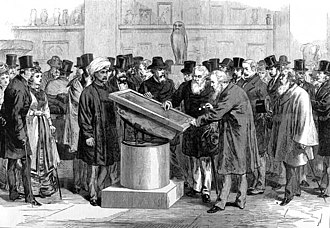
Experts inspecting the Rosetta Stone during the Second International Congress of Orientalists in London, 1874
Symbolic of this type of response to the end of the Cold War was the popularization of the 'clash of civilizations' thesis. This particular idea of a fundamental conflict between East and West was first advanced by Bernard Lewis in an article entitled "The Roots of Muslim Rage", written in 1990. Again, this was seen as a way of accounting for new forms and lines of division in post–Cold War international society. The 'clash of civilizations' approach involved another characteristic of Orientalist thought; namely, the tendency to see the region as being one, homogenous 'civilization', rather than as comprising various different and diverse cultures and strands. It was an idea that was taken on more famously by Samuel Huntington in his 1993 article in Foreign Affairs, called "The Clash of Civilizations?".[6]
The Orient
The word “Orient” refers to east.[7] It is a western word made to describe The east, meaning any country east of Europe.[8] It has included countries from a wide spectrum, from Morocco to Japan, depending on the historical period in which the term was used."Orientalism" and Oriental studies
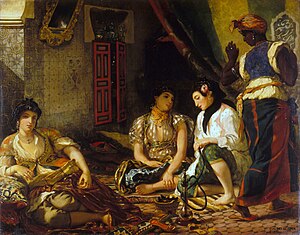
The Women of Algiers, 1834, by Eugène Delacroix is one of the earliest paintings from Western painters in the "Eastern world".
Main article: Orientalism
The term Orientalism has come to acquire negative connotations
in some quarters and is interpreted to refer to the study of the East
by Westerners shaped by the attitudes of the era of European imperialism
in the 18th and 19th centuries. When used in this sense, it often
implies prejudiced, outsider-caricatured interpretations of Eastern
cultures and peoples. This viewpoint was most famously articulated and
propagated by Edward Said in Orientalism
(1978), a critical history of this scholarly tradition. In contrast,
the term has also been used by some modern scholars to refer to writers
of the Imperialist era who had pro-Eastern attitudes, as opposed to
those who saw nothing of value in non-Western cultures.[9]From "Oriental Studies" to "Asian Studies"
| This section does not cite any references or sources. (February 2012) |
In most North American universities, Oriental Studies has now been replaced by Asian Studies localised to specific regions, such as Middle Eastern or Near Eastern Studies, South Asian studies, and East Asian Studies. This reflects the fact that the Orient is not a single, monolithic region but rather a broad area encompassing multiple civilizations. The generic concept of Oriental Studies, to its opponents, has lost any use it may have once had and is perceived as obstructing changes in departmental structures to reflect actual patterns of modern scholarship. In many universities, like Chicago, the faculties and institutions have divided; the Biblical languages may be linked with theological institutes, and the study of ancient civilizations in the region may come under a different faculty to studies of modern periods.
In 2007 the Faculty of Oriental Studies at Cambridge University was renamed the Faculty of Asian and Middle Eastern Studies, but Oxford still has its Faculty for Oriental Studies, as do Chicago, Rome, London (covering African studies also), and other universities.
Various explanations for the change to "Asian studies" are offered; a growing number of professional scholars and students of Asian Studies are themselves Asian or from groups of Asian origin (like Asian Americans). This change of labeling may be correlated in some cases to the fact that sensitivity to the term "Oriental" has been heightened in a more politically correct atmosphere, although it began earlier: Bernard Lewis' own department at Princeton University was renamed a decade before Said wrote his book, a detail that Said gets wrong.[10] By some, the term "Oriental" has come to be thought offensive to non-Westerners. Area studies that incorporate not only philological pursuits but identity politics may also account for the hesititation to use the term "Oriental".
Supporters of "Oriental Studies" counter that the term "Asian" is just as encompassing as "Oriental," and may well have originally had the same meaning, were it derived from an Akkadian word for "East" (a more common derivation is from one or both of two Anatolian proper names). Replacing one word with another is to confuse historically objectionable opinions about the East with the concept of "the East" itself. The terms Oriental/Eastern and Occidental/Western are both inclusive concepts that usefully identify large-scale cultural differences. Such general concepts do not preclude or deny more specific ones.
See also
- Arabist
- Hebraist
- Area studies
- Assyriology
- Egyptology
- Hebraic studies
- Hebraism
- Indology (study of the Indian subcontinent)
- Indonesian Studies
- Islamic Studies
- Islamism
- Iranistics
- Japonism
- Javanology (the study of Javanese culture and custom, notable person is Clifford Geertz)
- Jewish studies
- Jewish thought
- List of Islamic studies scholars
- at section 5. "Orientalists/Non-Muslims" appears an annotated list of over 150 western & eastern non-Muslim scholars, often with titles of their writings on Islam.
- Medieval Roman Catholic Missions in China
- Middle Eastern studies
- Oriental Institute
- Orientalism in early modern France
- Pakistan Studies
- Philology
- Silk Road
- Sindhology
- Sinology (study of China)
- School of Oriental and African Studies (SOAS)
- Tangutology
- Tibetology
- Turkology
References
- Jump up ^ Hebrew to Latin, Latin to Hebrew: the mirroring of two cultures 2006 Page 75 Giulio Busi, Freie Universität Berlin. Institut für Judaistik - 2006 "According to the famous decision of the council of Vienne (1311-1312), Oxford was chosen as one of four universities (with Paris, Bologna and Salamanca) where Hebrew, Arabic, Greek and Aramaic were to be taught"
- Jump up ^ Zachary Lockman, Contending Visions of the Middle East, Cambridge: Cambridge University Press, 2004:44
- Jump up ^ J Go, "'Racism' and Colonialism: Meanings of Difference and Ruling Practice in America's Pacific Empire" in Qualitative Sociology' 27.1 (March 2004).
- Jump up ^ Jochen Hippler and Andrea Lueg (eds.), 'The Next Threat: Western Perceptions of Islam' (Pluto Press/The Transnational Institute, London, 1995), p. 1.
- Jump up ^ Zachary Lockman, 'Contending Visions of the Middle East: the History and Politics of Orientalism' (Cambridge University Press, Cambridge, 2004), pp. 223/233.
- Jump up ^ Zachary Lockman, 'Contending Visions of the Middle East: the History and Politics of Orientalism' (Cambridge University Press, Cambridge, 2004), p. 233.
- Jump up ^ Cawley, Kevin. University of Notre Dame. Oriental. 2004. September 29, 2006
- Jump up ^ Katz, Elizabeth. Virginia Law. Democracy in the Middle East. 2006. September 9, 2006
- Jump up ^ For example Thomas R. Trautmann in Aryans and British India, 1997, ISBN 0-520-20546-4
- Jump up ^ Princeton University, Near Eastern Studies department
Institutions
- Asiatica Association
- School of Oriental and African Studies at the University of London
- Faculty of Oriental Studies at the University of Oxford
- Oriental Institute of the University of Chicago
- American Center for Oriental Research
- American Oriental Society
- Oriental Club of Philadelphia
- Smithsonian Institution, Freer Gallery of Art
- Institute of Oriental Studies of the Russian Academy of Sciences
- Institute of Oriental Manuscripts of the Russian Academy of Sciences
- The Institute of Oriental Culture at the Tokyo University
- Institute for Research in Humanities at the Kyoto University
- Tōyō Bunko in Tokyo
- School of Oriental Studies at Universidad del Salvador In Argentina
- Oriental Collections at Bulgarian National Library
- Uppsala University in Sweden
- The Department of Near Eastern Languages and Civilizations at Harvard University
Resources
Articles
- Dictionary of the History of Ideas: China in Western Thought and Culture
- John E. Hill, translation in his e-edition of Hou Hanshu
- Edward Said's Splash The impact of Edward Said's book on Middle Eastern studies, by Martin Kramer.
- Frontier Orientalism — an article by Austrian anthropologist Andre Gingrich
- Edward Said and the Production of Knowledge
- Orientalism as a tool of Colonialism
 "Oriental Study and Research". Catholic Encyclopedia. New York: Robert Appleton Company. 1913.
"Oriental Study and Research". Catholic Encyclopedia. New York: Robert Appleton Company. 1913.
Further reading
- Crawley, William. "Sir William Jones: A vision of Orientalism", Asian Affairs, Vol. 27, Issue 2. (Jun. 1996), pp. 163–176.
- Fleming, K.E. "Orientalism, the Balkans, and Balkan Historiography", The American Historical Review, Vol. 105, No. 4. (Oct., 2000), pp. 1218–1233.
- Halliday, Fred. "'Orientalism' and Its Critics", British Journal of Middle Eastern Studies, Vol. 20, No. 2. (1993), pp. 145–163.
- Irwin, Robert. For lust of knowing: The Orientalists and their enemies. London: Penguin/Allen Lane, 2006 (hardcover, ISBN 0-7139-9415-0). As Dangerous Knowledge: Orientalism and Its Discontents. New York: Overlook Press, 2006 (hardcover, ISBN 1-58567-835-X).
- Reviewed by Philip Hensher in The Spectator, January 28, 2006.
- Reviewed by Allan Massie in the Telegraph, February 6, 2006.
- Reviewed by Terry Eagleton in the New Statesman, February 13, 2006.
- Reviewed by Bill Saunders in The Independent, February 26, 2006.
- Reviewed by Noel Malcolm in The Telegraph, February 26, 2006.
- Reviewed by Maya Jasanoff in the London Review of Books, June 8, 2006.
- Reviewed by Wolfgang G. Schwanitz in Frankfurter Rundschau, June 26, 2006.
- Reviewed by William Grimes in the New York Times, November 1, 2006.
- Reviewed by Michael Dirda in The Washington Post, November 12, 2006.
- Reviewed by Lawrence Rosen in the Boston Review, January/February 2007.
- Klein, Christina. Cold War Orientalism: Asia in the Middlebrow Imagination, 1945–1961. Berkeley: University of California Press, 2003 (hardcover, ISBN 0-520-22469-8; paperback, ISBN 0-520-23230-5).
- Knight, Nathaniel. "Grigor'ev in Orenburg, 1851–1862: Russian Orientalism in the Service of Empire?", Slavic Review, Vol. 59, No. 1. (Spring, 2000), pp. 74–100.
- Kontje, Todd. German Orientalisms. Ann Arbor, MI: University of Michigan Press, 2004 (ISBN 0-472-11392-5).
- Little, Douglas. American Orientalism: The United States and the Middle East Since 1945. Chapel Hill: The University of North Carolina Press, 2001 (hardcover, ISBN 0-8078-2737-1); 2002 (paperback, ISBN 0-8078-5539-1); London: I.B. Tauris, 2002 (new ed., hardcover, ISBN 1-86064-889-4).
- Murti, Kamakshi P. India: The Seductive and Seduced "Other" of German Orientalism. Westport, CT: Greenwood Press, 2001 (hardcover, ISBN 0-313-30857-8)
- Suzanne L. Marchand: German Orientalism in the Age of Empire - Religion, Race and Scholarship, German Historical Institute, Washington, D.C. and Cambridge University Press, New York 2009 ISBN 978-0-521-51849-9 (hardback)
- Noble dreams, wicked pleasures: Orientalism in America, 1870–1930 by Holly Edwards (Editor). Princeton: Princeton University Press, 2000 (hardcover, ISBN 0-691-05003-1; paperback, ISBN 0-691-05004-X).
- Cawley, Kevin. University of Notre Dame. Oriental. 2004. September 29, 2006
- Katz, Elizabeth. Virginia Law. Democracy in the Middle East. 2006. September 9, 2006
- Gusterin, Pavel. Первый российский востоковед Дмитрий Кантемир / First Russian Orientalist Dmitry Kantemir. Мoscow, 2008. ISBN 978-5-7873-0436-7.
- Wokoeck, Ursula. German Orientalism: The Study of the Middle East and Islam from 1800 to 1945. London: Routledge, 2009. ISBN 978-0-415-46490-1
- Reviewed by Wolfgang G. Schwanitz in Insight Turkey, 12(2010)4, 225-7.
- Lockman, Zachary. Contending Visions of the Middle East. The History and Politics of Orientalism. New York: Cambridge University Press 2004, ISBN 0-5216-2937-3.








